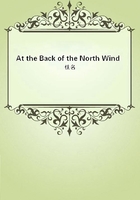
第26章
AT THE BACK OF THE NORTH WIND
I HAVE now come to the most difficult part of my story. And why?
Because I do not know enough about it. And why should I not know as much about this part as about any other part? For of course I could know nothing about the story except Diamond had told it;and why should not Diamond tell about the country at the back of the north wind, as well as about his adventures in getting there?
Because, when he came back, he had forgotten a great deal, and what he did remember was very hard to tell. Things there are so different from things here! The people there do not speak the same language for one thing. Indeed, Diamond insisted that there they do not speak at all. I do not think he was right, but it may well have appeared so to Diamond. The fact is, we have different reports of the place from the most trustworthy people.
Therefore we are bound to believe that it appears somewhat different to different people. All, however, agree in a general way about it.
I will tell you something of what two very different people have reported, both of whom knew more about it, I believe, than Herodotus.
One of them speaks from his own experience, for he visited the country;the other from the testimony of a young peasant girl who came back from it for a month's visit to her friends. The former was a great Italian of noble family, who died more than five hundred years ago;the latter a Scotch shepherd who died not forty years ago.
The Italian, then, informs us that he had to enter that country through a fire so hot that he would have thrown himself into boiling glass to cool himself. This was not Diamond's experience, but then Durante--that was the name of the Italian, and it means Lasting, for his books will last as long as there are enough men in the world worthy of having them--Durante was an elderly man, and Diamond was a little boy, and so their experience must be a little different.
The peasant girl, on the other hand, fell fast asleep in a wood, and woke in the same country.
In describing it, Durante says that the ground everywhere smelt sweetly, and that a gentle, even-tempered wind, which never blew faster or slower, breathed in his face as he went, making all the leaves point one way, not so as to disturb the birds in the tops of the trees, but, on the contrary, sounding a bass to their song.
He describes also a little river which was so full that its little waves, as it hurried along, bent the grass, full of red and yellow flowers, through which it flowed. He says that the purest stream in the world beside this one would look as if it were mixed with something that did not belong to it, even although it was flowing ever in the brown shadow of the trees, and neither sun nor moon could shine upon it.
He seems to imply that it is always the month of May in that country.
It would be out of place to describe here the wonderful sights he saw, for the music of them is in another key from that of this story, and I shall therefore only add from the account of this traveller, that the people there are so free and so just and so healthy, that every one of them has a crown like a king and a mitre like a priest.
The peasant girl--Kilmeny was her name--could not report such grand things as Durante, for, as the shepherd says, telling her story as I tell Diamond's--"Kilmeny had been she knew not where, And Kilmeny had seen what she could not declare;Kilmeny had been where the cock never crew, Where the rain never fell, and the wind never blew.